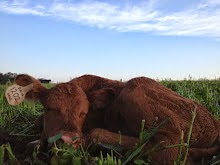I found this interesting article about bees, and why we are losing them around the world. We all know how important bees are, and we all know how we are loosing them.
Researchers finally pin down the most likely cause of the insects' widespread collapse -- and the fix will not be easy.
Honeybee colonies across the nation have been devastated over the past
year, leaving scientists desperate to root out the cause. One team of
researchers may have found the answer.
Colony collapse disorder, as it is called, has destroyed as much as half of the honeybee hives that farmers need to pollinate fruit and vegetable crops. As a result, some experts are predicting crop shortages and higher food prices.
But to fix the problem, you need to find the cause. A new study out this week points to the most likely factor: a combination of pesticides and fungicides that farmers use to keep crops healthy.
Those chemicals hurt bees' ability to fight infection from a parasite called Nosema ceranae, Quartz reports. The fungicides are particularly harmful because bees that ate pollen with those chemicals were three times as likely to get infected by the parasite.
The pollen the researchers collected for their study was from the East Coast and had an average of nine pesticides and fungicides. One sample, however, contained 21 chemicals.
Researchers still aren't able to say that those fungicides are the definite cause of bee death, but this is as close to an answer as we have at this point. "There's growing evidence that fungicides may be affecting the bees on their own and I think what it highlights is a need to reassess how we label these agricultural chemicals," the study’s lead author told Quartz.
If fungicides are the culprit, it would be a surprise to many farmers, since fungicides have to this point been considered safe for pollinating bees.
But the link is there. And what farmers do with that information could affect the survival of bees across the country.
Colony collapse disorder, as it is called, has destroyed as much as half of the honeybee hives that farmers need to pollinate fruit and vegetable crops. As a result, some experts are predicting crop shortages and higher food prices.
But to fix the problem, you need to find the cause. A new study out this week points to the most likely factor: a combination of pesticides and fungicides that farmers use to keep crops healthy.
Those chemicals hurt bees' ability to fight infection from a parasite called Nosema ceranae, Quartz reports. The fungicides are particularly harmful because bees that ate pollen with those chemicals were three times as likely to get infected by the parasite.
The pollen the researchers collected for their study was from the East Coast and had an average of nine pesticides and fungicides. One sample, however, contained 21 chemicals.
Researchers still aren't able to say that those fungicides are the definite cause of bee death, but this is as close to an answer as we have at this point. "There's growing evidence that fungicides may be affecting the bees on their own and I think what it highlights is a need to reassess how we label these agricultural chemicals," the study’s lead author told Quartz.
If fungicides are the culprit, it would be a surprise to many farmers, since fungicides have to this point been considered safe for pollinating bees.
But the link is there. And what farmers do with that information could affect the survival of bees across the country.


No comments:
Post a Comment